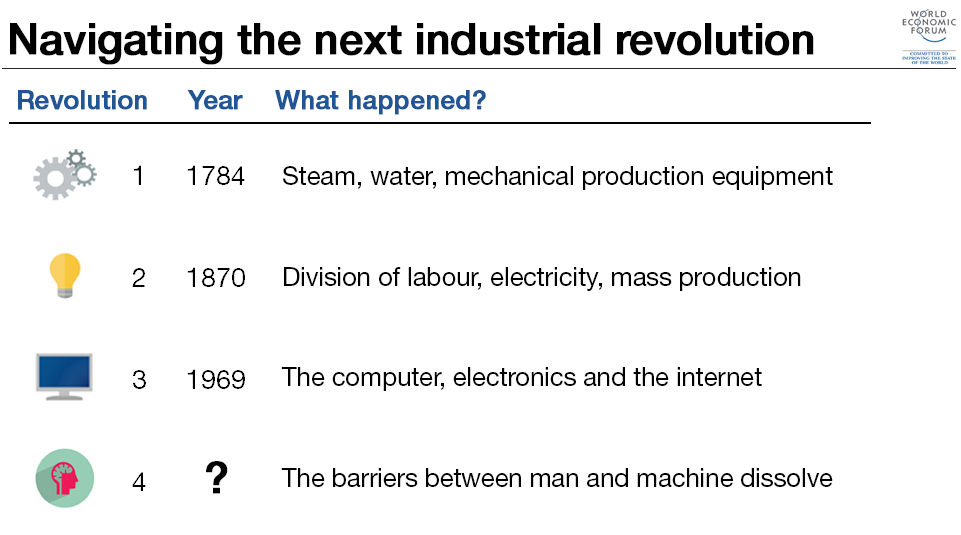Essay contest: What does the fourth industrial revolution mean to you?

This article is published in collaboration with Medium.
The eighteenth century’s cotton looms and steam engines overturned the way the world worked in the first industrial revolution. Then came mass production, with the efficient factories of the early twentieth century changing the nature of labour. Then the computer age, as PCs gradually shrank from the size of a room to something that would fit in the palm of your hand.
And now we’re in the middle of the most profound and fast-moving economic shift of them all. Man and machine are converging, digitisation is disrupting everything, new technologies are emerging more quickly than we can imagine them, let alone think up the rules to govern their use. This is the Fourth Industrial Revolution, a new era where we will be able to 3D-print both livers and guns.
Mastering the Fourth Industrial Revolution is the theme of the World Economic Forum’s Annual Meeting 2016 in Davos. Before we can master it, we need to define it.
Here, Professor Klaus Schwab, Founder and Executive Chairman at the World Economic Forum, explains how this revolution differs from others in its speed, breadth and impact.
What does this change mean to you? Can you provide a concrete example of how the Fourth Industrial Revolution will play out in your community, your industry, or even in your family? What should we do to manage its risks and reap its rewards?
We are inviting essay submissions of up to 900 words on the theme of the Fourth Industrial Revolution. A shortlist of five essays will be published on the World Economic Forum’s Agenda blog platform, which is read by 1.5 million people a month. The winning essay will be shared with delegates at Davos and promoted across our social media channels during the meeting, while the winner will receive a signed copy of Professor Klaus Schwab’s book.
If you would like to enter, please follow these steps:
1. Publish your essay on Medium
2. Tag your essay “Davos essay contest”
3. Email the link to essaycontest@weforum.org
4. The deadline for submissions is December 31st. The shortlist will be announced on Medium and Forum Agenda on January 11th, and the winner on January 18th.
5. The contest is for members of the public. World Economic Forum staff and constituents are not eligible.
Publication does not imply endorsement of views by the World Economic Forum.
To keep up with the Agenda subscribe to our weekly newsletter.
Author: Ceri Parker is Commissioning Editor at the World Economic Forum.
Image: Honda’s latest version of the Asimo humanoid robot runs during a presentation in Zaventem near Brussels. REUTERS/Francois Lenoir.
Don't miss any update on this topic
Create a free account and access your personalized content collection with our latest publications and analyses.
License and Republishing
World Economic Forum articles may be republished in accordance with the Creative Commons Attribution-NonCommercial-NoDerivatives 4.0 International Public License, and in accordance with our Terms of Use.
The views expressed in this article are those of the author alone and not the World Economic Forum.
Stay up to date:
Fourth Industrial Revolution
Forum Stories newsletter
Bringing you weekly curated insights and analysis on the global issues that matter.
More on Fourth Industrial RevolutionSee all
Rodrigo Liang
January 3, 2025








